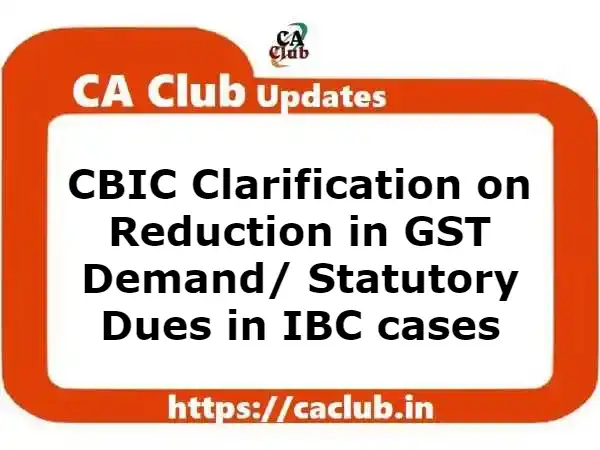CBIC has clarified the issues relating to the treatment of reduction in statutory dues/ GST demands in cases where the proceedings under the Insolvency and Bankruptcy Code, 2016 (IBC) have been finalised, via Circular 187/19/2022.
Previously, CBIC clarified in GST Circular 134/04/2020 that no coercive action can be taken against a corporate debtor for debts owed prior to the start of the Corporate Insolvency Resolution Process (CIRP). Such debts will be treated as ‘operational debt,’ and claims may be filed before the NCLT by the appropriate officer in accordance with the provisions of the IBC.
However, CBIC later received representations seeking clarification on the modalities for implementing the Adjudicating Authority’s order under the IBC with respect to demand for recovery against such corporate debtor under the CGST Act 2017/existing laws and the treatment of such statutory dues under the CGST Act 2017/existing laws, following the completion of the proceedings under the IBC.
To ensure consistency in the implementation of GST law provisions across field formations, the CBIC issued a clarification circular in exercise of its powers under section 168(1) of the CGST Act 2017.
CBIC has provided clarification that according to Section 84 of the CGST Act 2017, if the government dues against any person under this Act are reduced as a result of any appeal, revision, or other proceedings in respect of such government dues, then an intimation for such reduction of government dues has to be given by the Commissioner. CBIC has stated that this intimation must be given by the Commissioner to such person and to the appropriate authority with whom the recovery proceedings are pending. In addition, recovery proceedings can be continued even if the amount of government dues has been reduced.
The term “other proceedings” is not defined in the 2017 CGST Act. It should be noted that the adjudicating and appellate authorities under the IBC are quasi-judicial authorities established to deal with civil disputes involving insolvency and bankruptcy. For example, under IBC, the NCLT acts as an adjudicating authority for insolvency proceedings initiated by any stakeholder of the entity, such as the firm, creditors, debtors, employees, and so on, and passes an order approving the resolution plan. Because IBC proceedings also adjudicate government dues owed to the corporate debtor under the CGST Act 2017/existing laws, they appear to be covered by the term ‘other proceedings’ in Section 84 of the CGST Act 2017.
CGST Rule 161 specifies FORM GST DRC-25 for issuing intimation for such demand reduction specified in Section 84 of the CGST Act 2017. As a result, in cases where the tax authorities have issued a confirmed demand for recovery and a summary in FORM GST DRC-07/07A against the corporate debtor, and where the proceedings against the corporate debtor have been finalised under IBC, reducing the amount of statutory dues payable by the corporate debtor to the government under the CGST Act or under existing laws, the jurisdictional Commissioner shall issue an intimation in FORM GST DRC-2.
CBIC GST Circular 187/19/2022 dt. 27/12/2022: Clarification on Statutory Dues in IBC cases under GST

CBIC has prescribed the procedures for taking cognizance of the Adjudication Order issued under IBC, 2016, for the purpose of appropriately adjusting the demand for recovery under the CGST Act, 2017. Accordingly, where the tax authorities have issued a confirmed demand in FORM GST DRC-07/DRC-07A and the I&B proceedings against the company have reduced the amount of statutory dues under the CGST Act, 2017, the jurisdictional Commissioner is now required to issue an intimation in FORM GST DRC-25 reducing such demand for recovery. That’s great!